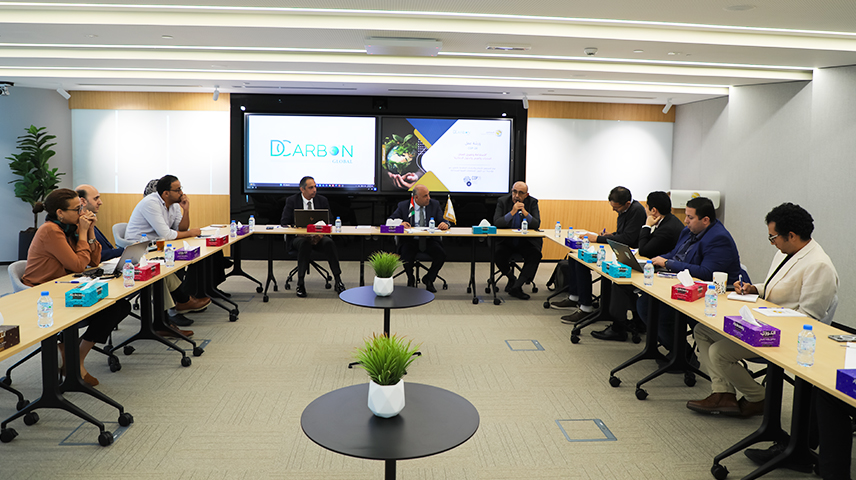On Thursday, December 7, 2023, Future for Advanced Rеsеarch and Studiеs (FARAS) held a workshop in cooperation with DCarbon Egypt titled "Sustainability and Climate Finance: Challenges, Opportunities, and Innovative Solutions." The workshop brought together еxpеrts from DCarbon Egypt, including Dr. Ehab Shalaby, CEO of the company, and Dr. Hisham Issa, senior advisor and climate change and environment expert. The following were the most notable general trends of the discussion addressed by the two experts in the panel discussion:
1. The Peculiarity of Climate Change
Given its political, economic, and social nature, climate change is one of the most complex global issues. It necessitates the development of multi-sectoral policies that extend beyond the energy sector to include various economic activities such as construction, real estate, and others.
2. Addressing Climate Change Globally
The issue of climate change has gone through a long stage of negotiations, beginning with the United Nations Conference on Environment and Development, also known as the "Earth Summit," in Rio de Janeiro, Brazil, in 1992 and ending with the United Nations Climate Change Conference (COP28) in the United Arab Emirates from November 30 to December 12, 2023.
The global climate change philosophy is based on two fundamental principles: historical responsibility for carbon emissions since the Industrial Revolution and the principle of collective participation with varying burdens between developing and developed countries. The 2015 Paris Climate Agreement was a turning point in climate discussions by requiring all countries to decrease carbon emissions and provide what are known as Nationally Determined Contributions. The Paris Agreement provided a broad framework for stimulating investment to combat climate change and supported the distribution of funds to developing nations to mitigate the effects of extreme weather events. However, the funds being implemented or delivered on the ground are minimal to address climate change.
3. Climate Experiences in the Arab World
Hosting COP27 in Egypt last year and COP28 in the UAE this year highlights the Middle East region's drive and dedication to finding global solutions to climate change. Indeed, holding the last two editions of the climate conference in the region will have a good impact on the development of significant societal and technological expertise that will aid in developing an effective response to the effects of climate change.
4. COP-28 Features
Among other climate conferences, COP28 is regarded as the most notable due to the large number of participants (up to 100,000), including official delegations, the private sector, financial institutions, and civil society organizations. The strong representation of the private sector at this summit is critical for moving climate action forward because the execution of climate policies will be unattainable without the participation of the private sector in international climate policies.
5. UAE Banks' Contributions
During the COP28 meeting, Emirati financial institutions actively provided climate and sustainability funding, introduced several green products, and provided substantial financing for international and regional climate action.
Banks must be included in international climate action, given their critical role in providing the finances required for renewable energy, hydrogen, and other projects. In this context, global banks are working to keep up with international attempts to address climate change by incorporating sustainability standards into their operating processes and assessing their financing portfolios' environmental and climate effects. In the near future, every bank in each country may be obliged to disclose its environmental and climate footprint.
6. Reducing Carbon Footprint
Companies will be required to make changes to their financial statements to disclose their carbon footprint and the environmental implications of their products as part of international climate action. The sustainability factors have become crucial for entry into some markets, such as Europe, as the European Union recently passed the Carbon Border Adjustment Mechanism (CBAM), which intends to import fewer carbon-intensive products. Suppliers of cement, iron, steel, aluminum, fertilizers, electricity, and hydrogen to EU member states will be required to report the amount of carbon emitted by their products and pay additional fees for carbon emissions over the permissible limit at a later stage, undermining the competitiveness of some exporting companies for European Union markets.
7. The Importance of Digital Solutions
Digitalization is essential in assisting the world in providing creative ways to address climate change. For example, it can give the tools to monitor, measure, and estimate carbon emissions to forecast their future courses.
8. Activating the "Loss and Damage" Fund
One of the most notable positive aspects of the COP28 conference was the establishment of the Climate Loss and Damage Fund to compensate the countries most affected by climate change. This was a historic step because the conference mobilized millions of dollars in funding for climate change efforts. The likelihood of developing countries obtaining funds to combat climate change will rise over time, particularly if their institutions and companies commit to implementing the appropriate laws and actions to consider future sustainability features.


